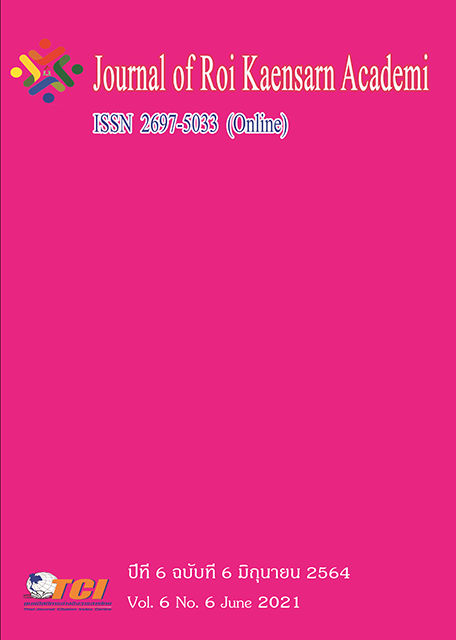แนวทางการพัฒนาการมีส่วนร่วมของประชาชน ในการจัดการน้ำสู่ความยั่งยืน
Main Article Content
บทคัดย่อ
บทความวิชาการนี้มีวัตถุประสงค์ 1. เพื่อศึกษาแนวทางการพัฒนาการมีส่วนร่วมของประชาชนในการจัดการน้ำสู่ความยั่งยืน 2. เพื่อศึกษาแนวคิดทฤษฎีการมีส่วนร่วมของประชาชนในการจัดการน้ำ รวมทั้งการประสานให้เกิดการมีส่วนร่วมของชุมชนและองค์กรชุมชนในระดับพื้นที่เพื่อสนับสนุนกิจกรรมการดำเนินงานของโครงการและริเริ่มกิจกรรมนำร่องระดับชุมชน และการจัดทำแผนปฏิบัติการชุมชนเพื่อการจัดการทรัพยากรลุ่มน้ำ และผลักดันแผนสู่การปฏิบัติ
องค์ความรู้ / ข้อค้นพบจากบทความนี้เพื่อนำไปเป็นแนวทางในการพัฒนาการมีส่วนร่วมของประชาชนนั้นต้องอาศัยกลไกการมีส่วนร่วมของทุกฝ่ายแบบบูรณาการร่วมกัน ต้องสร้างจิตสำนึกใหม่ของคนในสังคมให้มุ่งผลประโยชน์ส่วนรวม และปรับวิธีคิด ทัศนคติในการดำเนินชีวิตใหม่ที่ส่งผลกระทบต่อสิ่งแวดล้อมน้อยลง มุ่งไปสู่การเปลี่ยนแปลงระบบบริหารจัดการแนวใหม่ที่มุ่งสู่ประสิทธิภาพและคุณภาพอย่างแท้จริง เน้นการรักษาและฟื้นฟูฐานทรัพยากรธรรมชาติ การบริหารจัดการทรัพยากรน้ำให้มีประสิทธิภาพ ให้ทุกส่วนของสังคมรู้ถึงคุณค่าของน้ำ ใช้น้ำอย่างพอประมาณมีเหตุผล เพื่อให้ทรัพยากรน้ำมีใช้อย่างทั่วถึงให้เกิดประโยชน์สูงสุดภายใต้การพัฒนาแบบยั่งยืน โดยให้ทุกส่วนในสังคม ทั้งภาครัฐ ภาคเอกชนประชาชนและผู้ที่เกี่ยวข้อง มีส่วนร่วมในการจัดการน้ำอย่างมีเอกภาพเป็นอันหนึ่งอันเดียวกัน
Article Details
เอกสารอ้างอิง
กรมทรัพยากรน้ำ. (2556). โครงการจัดทำแผนยุทธศาสตร์การบริหารจัดการทรัพยากรน้ำ 25 ลุ่มน้ำ. กรุงเทพมหานคร: ปัญญาคอนซัลแตนท์ และ พี แอนด์ ซี แมเนจเมนท์.
กระทรวงวิทยาศาสตร์และเทคโนโลยี (วท.). (2560). คู่มือการจัดการทรัพยากรน้ำชุมชนตามแนวพระราชดำริ ด้วยวิทยาศาสตร์และเทคโนโลยี. กรุงเทพมหานคร: กระทรวงวิทยาศาสตร์และเทคโนโลยี
ปราโมทย์ ไม้กลัด. (2557). ทางออกการบริหารจัดการน้ำของไทย .ออนไลน์. สืบค้นเมื่อ 15 เมษายน 2564.แหล่งที่มา: https://tdri.or.th/water/thaipublica20140309/.
พระมหาประกาศิต สิริเมโธ. (2556). การมีส่วนร่วมของประชาชนในการพัฒนาหมู่บ้านเศรษฐกิจพอเพียงของชุมชนบ้านคลองใหม่ อำเภอสามพราน จังหวัดนครปฐม. วิทยานิพนธ์พุทธศาสตร์มหาบัณฑิต วิชาการพัฒนาสังคม. บัณฑิตวิทยาลัย: มหาวิทยาลัยมหาจุฬาลงกรณราชวิทยาลัย.
มิ่งสรรพ์ ขาวสอาด และคณะ. (2554). โครงการ “แนวนโยบายการจัดการน้ำสำหรับประเทศไทย” เล่ม 1.กรุงเทพมหานคร: สำนักงานกองทุนสนับสนุนการวิจัย (สกว.).
วีรยา ภูมิฐาน. (2554). แนวทางการพัฒนาทรัพยากรธรรมชาติและสิ่งแวดล้อมอย่างยั่งยืน. ออนไลน์. สืบค้นเมื่อ 15 เมษายน 2564. แหล่งที่มา: https://www.sites.google.com/site/fanxy14/bth-thi7-naew thang-kar-phathna-thraphyakrthrrmchati-laea-sing-waedlxm-xyang-yangyun.
สำนักงานคณะกรรมการพัฒนาการเศรษฐกิจและสังคมแห่งชาติ. (2546). การพัฒนาที่ยั่งยืนในบริบทไทย. เอกสารประกอบการประชุมประจำปี 2546. 30 มิถุนายน 2546. ศูนย์การประชุมและแสดงสินค้าอิมแพ็คเมืองทองธานี. นนทบุรี.
สำนักงานคณะกรรมการพัฒนาการเศรษฐกิจและสังคมแห่งชาติ สำนักนายกรัฐมนตรี. (2559). ประกาศเรื่องแผนพัฒนาเศรษฐกิจและสังคมแห่งชาติ ฉบับที่ 12 (พ.ศ. 2560 - 2564). 30 ธันวาคม 2559.
สำนักงานทรัพยากรน้ำแห่งชาติ. (2561). ยุทธศาสตร์การบริหารจัดการทรัพยากรน้ำ. ออนไลน์. สืบค้นเมื่อ 15เมษายน 2564. แหล่งที่มา: http://www.onwr.go.th/?page_id=4207.
สำนักส่งเสริมการมีส่วนร่วมของประชาชน, กรมชลประทาน, กระทรวงเกษตรและสหกรณ์. (2555). คู่มือการมีส่วนร่วมของประชาชน/กรมชลประทาน. (พิมพ์ครั้งที่3). กรุงเทพมหานคร: บริษัท ธนาเพรส จำกัด.
Pluemchit Sujitra. (2552). บทที่ 2 การใช้ทรัพยากรธรรมชาติและสิ่งแวดล้อมเพื่อการพัฒนาที่ยั่งยืน. ออนไลน์. สืบค้นเมื่อ 24 เมษายน 2564. แหล่งที่มา: https://sites.google.com/site/pluem chitsujitra/system/app/pages/sitemap/hierarchy.
Suparut G7. (2555). หลักการสร้างการมีส่วนร่วมของประชาชน. ออนไลน์. สืบค้นเมื่อ 15 เมษายน 2564.แหล่งที่มา: http://52011310474.blogspot.com/2012/05/blog-post_21.html.
William Erwin. (1976). Participation Management : Concept Theory and Implementation. Atlanta G.: Georgia State University.

